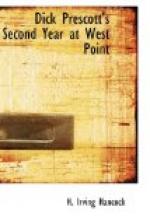Facing the president of the court, standing rigidly at attention, his face expressionless, his bearing every whit that of the soldier, Cadet Richard Prescott listened to the reading of the accusation of dishonor.
In an impressive tone the president of the court asked what plea the accused cadet wished to enter.
“The accused offers, to the charge and specifications, a blanket plea of ‘not guilty,’” replied Lieutenant Topham.
Captain Abbott was first called and sworn. In concise, soldierly language the instructor told the events of the preceding Friday forenoon. He described the dropping of the slip of paper, and of his request that it be handed to him. “The paper,” continued the witness, “contained a crude, brief outline of the demonstration which Mr. Prescott had just explained so satisfactorily that I had marked him 2.9.”
“Which is within one tenth of the highest marking?” suggested the judge-advocate.
“Yes, sir.”
“Had you noted anything in Mr. Prescott conduct or performance at the blackboard that indicated any uncertainty, at any time, about the problem he was demonstrating?”
“When he had gone a little way with the writing down of the demonstration,” replied Captain Abbott, “Mr. Prescott hesitated for some moments, then asked permission to erase, which was given.”
“Did he then go straight ahead with his work?”
“To the best of my observation and remembrance, he did, sir.”
“Had Mr. Prescott been doing well previously?” asked the judge-advocate.
“Only during the last week, sir. During the last week he displayed such a new knowledge and interest in mathematics that I was prepared, on his last week’s marks, to recommend that he ascend two sections in his class.”
“Is it not true, Captain, that Mr. Prescott, in the last week, showed such a sudden, new proficiency as might be accounted for by the possibility that he had then begun to carry written ‘cribs’ to the class?
“His progress last week was such as might be accounted for by that supposition,” replied the witness reluctantly.
“That is all, Captain.”
Lieutenant Topham then took the witness in hand, but did not succeed in bringing out anything that would aid the cause of the accused cadet.
“Cadet Dunstan!” called the judge-advocate.
Dunstan stepped forward and was sworn. He had testified that, during the blackboard work, he had stood beside Mr. Prescott. Dunstan was positive that he had not seen any slip of paper in Prescott’s hands.
“Did you look his way often, Mr. Dunstan
“Not directly, sir; I was busy with my own work.”
“Yet, had Mr. Prescott had a slip of paper held slyly in either hand, do you think you would have seen it?
“I am positive that I would, sir,” replied Cadet Dunstan.
Under the questioning of Lieutenant Topham, Dunstan stated that he had witnessed Prescott’s loan of his handkerchief to Dodge before the sections formed to march to mathematics section room.




